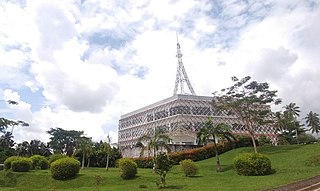
The University of Colombo is a public research university located primarily in Colombo, Sri Lanka. It is the oldest institution of modern higher education in Sri Lanka. Specialised in the fields of natural, social, and applied sciences as well as mathematics, computer sciences, and law. It is ranked among the top 10 universities in South Asia.

The University of Moratuwa, located on the bank of the Bolgoda Lake in Katubedda, Moratuwa is the most sought after technological university in Sri Lanka. Apart from academics including undergraduate and postgraduate studies, the University of Moratuwa presents social and cultural activities, student services, societies, and sports and recreational activities. The institution was known as Ceylon College of Technology, Katubedda before gaining university status. Its roots go back to the Institute of Practical Technology founded in 1960 to provide technical education.

Established in 1870 as the Colombo Medical School, the Faculty of Medicine of the University of Colombo, Sri Lanka, is the second oldest medical school in South Asia.

The University of Peradeniya is a state university in Sri Lanka, funded by the University Grants Commission. It was established as the University of Ceylon in 1942.

The University Grants Commission (UGC) is the body responsible for funding most of the State Universities in Sri Lanka, and operates within the frame work of the Universities Act No. 16 of 1978, itself established by the Cabinet Minister of Education & Higher Education at the time Dr. Nissanka Wijeyeratne in 1979. A public organisation, established under the Parliament Act No 16 of 1978. Location is at No 20, Ward Place Colombo 07.
North Colombo Medical College (NCMC) was the first privately funded medical school in Sri Lanka. It started in 1980 with the admission of 100 local and 20 foreign students. The first batch of students began graduating in 1990. Founded by the College of General Practitioners of Sri Lanka, Dr. G. M. Heenilame was its first chairman and Dr. W.D. Ratnavelle, its first director. It was nationalized in 1989 and became the Faculty of Medicine, University of Kelaniya. The first batch of students of the Faculty of Medicine, University of Kelaniya completed their five-year course and graduated with the MBBS degree in September 1996.
Amal Jayawardane is a Sri Lankan historian.
Vidya Jyothi E. O. Eustace Pereira was a Sri Lankan Engineer and Academic. He was the Vice Chancellor of the University of Ceylon, where he founded the Faculty of Engineering. He was known as the Father of modern engineering education in Sri Lanka.

The University of Jaffna is a public university in the city of Jaffna in Sri Lanka. Established in 1974 as the sixth campus of the University of Sri Lanka, it became an independent, autonomous university in 1979. Like all public universities in Sri Lanka, UoJ receives the bulk of its funding from the University Grants Commission (UGC), part of the Ministry of Higher Education in Colombo. The UGC and the central government therefore exert a great deal of control over the university.

The Faculty of Engineering, University of Peradeniya is one of the eight academic faculties at the university. It is the oldest engineering faculty in Sri Lanka. It offers full-time Undergraduate Courses leading to the degree of Bachelor of Science in Engineering (B.Sc.Eng.), and several other postgraduate degrees.

There is much research going on in Sri Lanka. Most is done through universities, government organizations, semi governmental organizations and non-governmental organizations. The research is funded by both Sri Lankan and foreign entities.
The University of Peradeniya, in Sri Lanka, is composed of nine undergraduate faculties of study. These faculties contain 79 departments in total. In addition, the university has two postgraduate institutions and six affiliated centres.

Ceylon University College was a public university college in Ceylon. Established in 1921, it was Ceylon's first attempt at university education. The college didn't award degrees under its own name but prepared students to sit the University of London's external examination. The college was based in Colombo. The college was merged with Ceylon Medical College in 1942 to form the University of Ceylon. The college was also known as University College, Ceylon; University College, Colombo; and Colombo University College. Its buildings and grounds are now occupied by the University of Colombo which is considered its successor.
The University of Colombo currently has seven faculties with 41 academic departments and two interdependent schools with five academic departments. All faculties and schools carries out courses of study and research in both graduate and undergraduate studies. In addition, the university has several institutions that specialize in different areas of research.

P. D. Premasiri is a Buddhist scholar specializing in the areas of Buddhist Ethics and Buddhist Philosophy. Premasiri's academic training represents a synthesis of both the Buddhist and Western philosophical traditions, first at the University of Peradeniya and subsequently at Cambridge and Hawaii. He is currently President of the Buddhist Publication Society and Professor Emeritus in the Department of Pali and Buddhist Studies at the University of Peradeniya.

Professor Kandiah David Arulpragasam was a Sri Lankan Tamil academic. He was the first vice-chancellor of Eastern University, Sri Lanka.
Velupillai Appapillai was a Sri Lankan physicist and academic. He was the dean of the Faculty of Science at the University of Ceylon, Peradeniya.

Wanigasekera Daya Ratnasooriya BSc. (Hons)(Cey), PhD DSc. FTWAS, FNASSL, FBiol, Charted Biologist, Institute of Biology, Sri Lanka, is a Sri Lankan academic and researcher. He is an emeritus professor of zoology, University of Colombo, Sri Lanka and a Senior Professor at the General Sir John Kotelawala Defence University, Sri Lanka.











